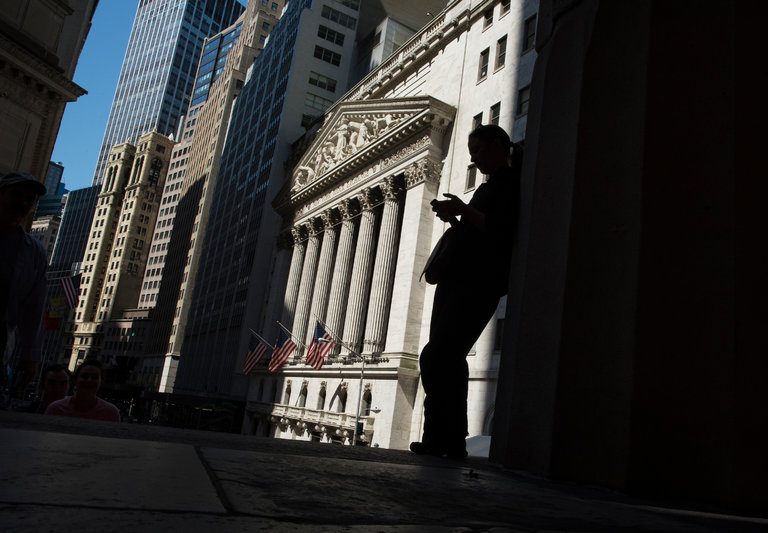 We’re looking at payments industry trends around the globe including new products, technology advances and what’s on the horizon for 2017. Wall Street Clearinghouse announced it will adopt bitcoin technology to track its transactions. According to PaymentsSource, e-commerce and payments will be deeply impacted by the “Uberization” of the payments industry. MasterCard’s future of payment cards could be described as a dip, a tap, a sip and a blink.
We’re looking at payments industry trends around the globe including new products, technology advances and what’s on the horizon for 2017. Wall Street Clearinghouse announced it will adopt bitcoin technology to track its transactions. According to PaymentsSource, e-commerce and payments will be deeply impacted by the “Uberization” of the payments industry. MasterCard’s future of payment cards could be described as a dip, a tap, a sip and a blink.
Jay Palter shares a list of the top 100 FinTech leaders and influencers to follow. Founder of Daniel Wellington watches invests in Swedish payment provider Klarna. China’s e-commerce will grow by 15% the next three years and e-wallets held 56% of the market share. Chinese state-owned companies launched a $1.5 billion fund to support emerging FinTech  startups and technologies. Amazon India will invest $22 million in its online payments services.
startups and technologies. Amazon India will invest $22 million in its online payments services.
Three critical payments trends in India include unique ID, Bluetooth and pay as you go payments according to Indianweb2.com. In Vietnam, e-commerce will reach $10 billion or 5% of the retail market as the government aims to convert 50% or rural residents to cashless payments by 2020. Meanwhile, the Central Bank of Nigeria is trying to curb overseas spending and promote contactless technology.
Wall Street Clearinghouse to Adopt Bitcoin Technology
 The announcement is one of the most advanced steps yet in Wall Street’s continuing effort to harness the technological concepts underlying Bitcoin.
The announcement is one of the most advanced steps yet in Wall Street’s continuing effort to harness the technological concepts underlying Bitcoin.
Wall Street has been drawn to the blockchain concept because it allows information to be recorded in real time without the bottleneck that central authorities generally introduce. The decentralized nature of the technology also makes it harder for attackers, or hackers, to take control of the network. Via nytimes.com
The ‘Uberization’ of payments pressures security and e-channel strategies
 While Uber “Uberized” the payments process where payment is an after-thought to consumers, Apple pay launched their “in-app” payments, and Facebook’s chatbots got an upgrade through PayPal.
While Uber “Uberized” the payments process where payment is an after-thought to consumers, Apple pay launched their “in-app” payments, and Facebook’s chatbots got an upgrade through PayPal.
What does all that mean for the payments industry? There are several trends as well challenges and opportunities that businesses will need to address, requiring a deft combination of both fraud prevention and omnichannel innovation. Via paymentssource.com
A dip, a tap, a text and a blink: The future of payment cards
 A selfie instead of a password that you type in when you’re paying online. A computer chip in a card that you’ll have to dip or tap when you’re shopping in-store. These are just two of the most recent innovations in the payment processing industry that MasterCard is gearing up to implement worldwide.
A selfie instead of a password that you type in when you’re paying online. A computer chip in a card that you’ll have to dip or tap when you’re shopping in-store. These are just two of the most recent innovations in the payment processing industry that MasterCard is gearing up to implement worldwide.
To do that, the company relies on fast and furious but secure technology, the cutting edge kind that a team of MasterCard executives and experts presented recently to a group of Southeast Asian journalists during tours of its tech headquarters in St. Louis, Missouri, and its tech hub in New York City. Via business.inquirer.net
Fintech Influencers to follow in 2017
 The financial services industry around the globe is undergoing a disruptive, digital transformation and these 100 fintech influencers are at the centre of a growing online community informing these changes. The fintech influencers listed below consist of experts, analysts and consultants, investors and venture capitalists, journalists and bloggers. They are included in this list, as Chris Ghedhill points out, because they have three important qualities in common: they have targeted audience reach, they’ve earned the trust and respect of their audience; and they share a high-quality stream of relevant information.
The financial services industry around the globe is undergoing a disruptive, digital transformation and these 100 fintech influencers are at the centre of a growing online community informing these changes. The fintech influencers listed below consist of experts, analysts and consultants, investors and venture capitalists, journalists and bloggers. They are included in this list, as Chris Ghedhill points out, because they have three important qualities in common: they have targeted audience reach, they’ve earned the trust and respect of their audience; and they share a high-quality stream of relevant information.
Our 2017 Fintech Jay Palter List consists of experts, analysts and consultants, investors and venture capitalists, journalists and bloggers. Via jaypalter.ca
Founder of Daniel Wellington watch brand quietly invested in Klarna
 The entrepreneur, who built a $180 million (£148 million) watch empire in less than five years, reportedly bought shares in Klarna that are today worth 53 million kroner (£7 million) through a firm he owns called JFT Holdings.
The entrepreneur, who built a $180 million (£148 million) watch empire in less than five years, reportedly bought shares in Klarna that are today worth 53 million kroner (£7 million) through a firm he owns called JFT Holdings.
The company lets customers buy products online by simply entering their email address and postcode. It then effectively extends the buyers a line of credit, buying what they’re after on their behalf and then emailing them later to ask them to fill in their card or payment details.
Klarna has raised over $290 million (£238 million) and is worth $2.25 billion (£1.85 billion), making it one of Sweden’s few billion dollar tech companies. Via businessinsider.com
China e-commerce market forecast to grow by 15% over next three years
 Chinese e-commerce is set to grow by 15 per cent by 2020, cementing its position as the biggest e-commerce market worldwide, according to a report issued by Worldpay, a leading payments company with global reach.
Chinese e-commerce is set to grow by 15 per cent by 2020, cementing its position as the biggest e-commerce market worldwide, according to a report issued by Worldpay, a leading payments company with global reach.
E-wallets were the most popular payment method in China in 2016 with an overwhelming 56 per cent of market share, followed by debit cards and credit cards, both with 11 per cent of the payments market, the London-listed Worldpay said.
Cash on delivery held an 8 per cent market share, with bank transfers taking the remaining 7 per cent of the market in 2016. The report predicted that as the e-commerce market in China matures over the next five years, e-wallets are set to decline by 10 percentage points to a 46 per cent market share as other payment methods start to increase in popularity among Chinese consumers. Via nationmultimedia.com
China Launches a $1.5 Bln FinTech Fund and Adopts to Consumers Going Cashless
 Chinese consumers are rapidly moving towards non-bank and cashless alternatives, such as Alibaba’s $60 billion financial application Alipay. To cope with the rapid growth rate of its FinTech industry, Chinese state-owned companies launched a $1.5 billion fund to support emerging FinTech startups and technologies.
Chinese consumers are rapidly moving towards non-bank and cashless alternatives, such as Alibaba’s $60 billion financial application Alipay. To cope with the rapid growth rate of its FinTech industry, Chinese state-owned companies launched a $1.5 billion fund to support emerging FinTech startups and technologies.
According to various sources, the fund will support startups in a wide range of categories within the FinTech industry, including big data, artificial intelligence, mobile payments, supply chain financing and Blockchain technology, developing a portfolio which covers every aspect of the country’s FinTech industry. Via cointelegraph.com
Amazon India pumps Rs. 150 crore ($22 million) into its burgeoning online payments business
 With the focus on cashless payments intensifying in the country, Amazon is now also looking to cash in on the opportunity. Thus, Amazon has not only infused a massive Rs. 150 crore into its payments arm but also authorized an increase in share capital for the said subsidiary. It is planning to build out a bigger payment business alongside its widely popular e-commerce platform.
With the focus on cashless payments intensifying in the country, Amazon is now also looking to cash in on the opportunity. Thus, Amazon has not only infused a massive Rs. 150 crore into its payments arm but also authorized an increase in share capital for the said subsidiary. It is planning to build out a bigger payment business alongside its widely popular e-commerce platform.
Further, Amazon India is aggressively working to set up its payments business in a country which is currently plagued with demonetization. It had decided to try a hand at digital payments last year with the acquisition of Noida-based online payments provider Emvantage. This was followed by the e-commerce giant applying for a license of semi-closed wallet through its subsidiary company. AODS has also released their digital wallet solution ‘Amazon Pay’ in the country just recently. Via thetechportal.com
3 Tech Innovations Set to Shape the Future of Payments
 The year 2016 will be historically acknowledged as the year of demonetization in India. While the public tried to deal with the aftermath of the surprise government move, retailers and fintech companies in India saw a new trend emerge. By the end of 2016, mobile internet usage overtook desktop for the very first time.
The year 2016 will be historically acknowledged as the year of demonetization in India. While the public tried to deal with the aftermath of the surprise government move, retailers and fintech companies in India saw a new trend emerge. By the end of 2016, mobile internet usage overtook desktop for the very first time.
The emergence of this trend meant that in the coming days, we would see mobile first strategies prevailing in mobile banking and e-commerce, and marketplaces, brands and banks will have to put in an extra effort in ensuring that their payment systems remain up to date so as to keep pace with the constantly changing environment. However, it has been observed that customers often end up opting out of a purchase if they find the payment procedure time-consuming and difficult to comprehend. But, the tech sector is making sure that it keeps innovating and making advancements to the already available tech on a timely-basis to make sure that this doesn’t ends up being the case. Via indianweb2.com
Vietnam urges retailers to ditch cash for plastic
 Vietnam is trying to convince at least 70 percent of its citizens aged 15 and over to open bank accounts and about 50 percent of urban residents to switch to non-cash payments via debit and credit cards by 2020.
Vietnam is trying to convince at least 70 percent of its citizens aged 15 and over to open bank accounts and about 50 percent of urban residents to switch to non-cash payments via debit and credit cards by 2020.
Online retail revenue is forecast to hit $10 billion in the next four years, accounting for 5 percent of the country’s total retail market, which grew 10.2 percent last year to $118 billion. Via e.vnexpress.net
Cards and Payments Industry in Nigeria Market Overview, Emerging Trends and Opportunities to 2019
 To limit the foreign exchange outflow from the country, in December 2015 the Central Bank of Nigeria (CBN) imposed a ban on the use of debit and credit cards abroad, and on transactions in foreign currencies. This prevented Nigerian customers from using cards to make purchases from overseas retailers, or from foreign e-commerce sites. However, following a severe consumer backlash, the ban was partly revoked in January 2016, with banks enabling consumers to use foreign exchange services with limits on transaction values. In January 2016, for instance, GTBank permitted customers to transfer foreign currency via online banking, its mobile app, or at any branch nationwide, subject to a daily limit of US$10,000 (NGN1.7 million). Similar restrictions were imposed by other banks, such as First Bank of Nigeria and Sterling Bank. This restriction is anticipated to slow payment card transaction volumes and values.
To limit the foreign exchange outflow from the country, in December 2015 the Central Bank of Nigeria (CBN) imposed a ban on the use of debit and credit cards abroad, and on transactions in foreign currencies. This prevented Nigerian customers from using cards to make purchases from overseas retailers, or from foreign e-commerce sites. However, following a severe consumer backlash, the ban was partly revoked in January 2016, with banks enabling consumers to use foreign exchange services with limits on transaction values. In January 2016, for instance, GTBank permitted customers to transfer foreign currency via online banking, its mobile app, or at any branch nationwide, subject to a daily limit of US$10,000 (NGN1.7 million). Similar restrictions were imposed by other banks, such as First Bank of Nigeria and Sterling Bank. This restriction is anticipated to slow payment card transaction volumes and values.
Following government measures to curb cash transactions and promote electronic payments, the CBN reduced the daily cash withdrawal limit from US$908.4 (NGN150,000) to US$363.4 (NGN60,000) from August 2015. Previously, the CBN imposed a surcharge of US$0.4 (NGN65) from fourth withdrawals from non-base-bank ATMs from September 2014. Enforcement of these regulations supports the government’s policy of making Nigeria a cashless society.
Contactless technology is gaining prominence in Nigeria. In May 2015, six banks – UBA, Access Bank, First Bank, Zenith Bank, Skye Bank and Diamond Bank – signed an agreement with payment solution provider Unified Payments to launch PayAttitude, to promote contactless payments in Nigeria. PayAttitude is a near-field technology (NFC) enabled tag-based mobile payment solution that works with contactless POS terminals. UBA introduced debit cards in Nigeria in November 2015 enabled with NFC technology for use at contactless POS and ATM terminals. Via emailwire.com








LET’S CONNECT